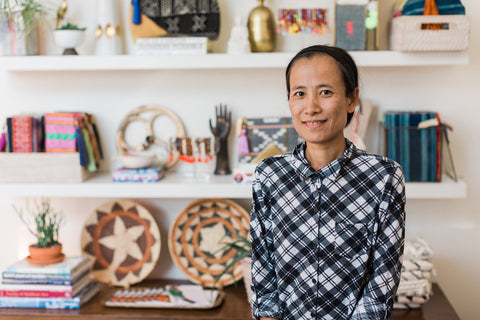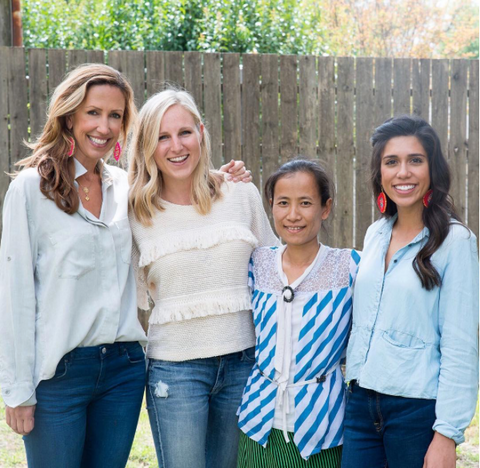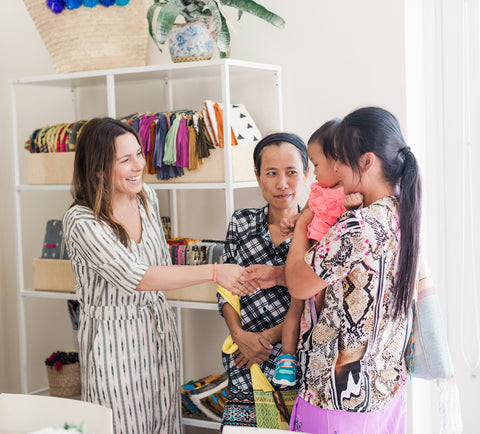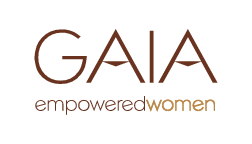Meet Maria

Maria Sho is the very definition of the word “sprite.” Tiny, cheerful, and mischievous, she has a twinkle in her eye and a sly smile on her face. And though she speaks very little English, it’s easy to tell she has a quick wit and sharp mind.
Now 40, Maria arrived in the United States with her family in 2009. She joined the GAIA family shortly thereafter, and eight years later is still sewing for us from her home in Northeast Dallas.
Maria and her husband, Jowah Ni, fled Burma for a refugee camp in Thailand in 1996. (Burma is a republic in Southeast Asia also known as Myanmar. Killings, torture, rape, landmines, and forced labor of ethnic minorities by the Burmese military regime are not uncommon.) They lived in the camp, on the border of Thailand and Burma, with tens of thousands of others for 13 years. There, Maria became a mother to their three boys — Sanay, Laurie, and Joseph.
She remembers life in the camp as extremely difficult. She had no work, and Jowah spent much of his time away from the camp, fighting with the Karen National Liberation Army. (The KNLA has been fighting the Burmese government since 1949 for the self-determination of the Karen people of Burma. The Karens are an ethnic minority in Burma.)

A Fresh Start
When Maria recalls the day an NGO group came to her camp to ask people to apply to live in the United States, she claps her hands and laughs. She didn’t hesitate to put her name on the list, saying, “I thought, ‘Maybe life is better there than in the camps.’”
And she wasn’t wrong about that.
After thorough mental and physical vetting by various agencies — there are multiple interviews and health tests before a refugee is given clearance to travel to the United States — she arrived in Dallas.
She and Jowah were worried at first. “When I looked around, I didn’t know what to think,” she says. “Jowah thought it was difficult here. We didn’t know where to go and what to do. We didn’t know who to ask for help.”

A Happy Ending
The International Rescue Committee, an organization that helps refugees resettle and rebuild their lives, introduced Maria to Catherin, another Burmese refugee who relocated to Dallas earlier that same year. The two women became like sisters, sharing their struggles and finding reasons to laugh together as their children also became fast friends.
Catherin was already working with GAIA, and soon Maria joined our team as well. Today, Jowah works in a restaurant, clearing tables and washing dishes. Their three children — now 20, 15, and 11 — are happy and healthy. They all inherited their mother’s hilariously dry sense of humor and have been known to prank us when we call.

Maria says she is never homesick — a sentiment not often expressed by the refugees who work with us. She says is incredibly happy to be living in a safe place and to have the opportunity to work to take care of her boys. “I never want to go back,” she says.
Maria and the other refugee artisans who work at GAIA are why we exist. They inspire us to work hard and remind us to always be grateful.
To read Catherin’s story, go here. To learn more about about refugee resettlement and how you can help, go to rescue.org.

Comments on this post (1)
I have really enjoyed getting to know Maria. Her son, Joseph, is a friend of my son at Wallace Elementary. Joseph is on our soccer team and we love his humor too! Let me know how I can purchase one of Maria’s products.
— Joannah